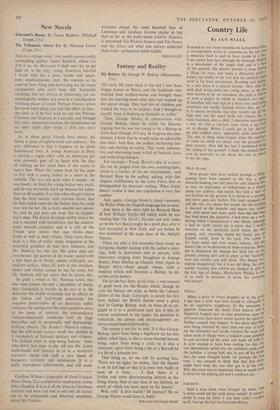Fantasy and Reality
'My early life came back to me and I saw those sloppy houses in Mayo, and the landlords who married their scullery-maids and brought them into the drawing-room after they had washed up the dinner things. They had lots of children and trained the boys to be jockeys. And I thought to myself, there is nothing so fantastic as reality.'
Thus, George Moore, in conversation with George Bishop, whom he called the Deacon, arguing that he was too young to be a Bishop in those days (though, if I may be forgiven the com- pliment, I think that he would make an admirable 'one now). And thus, the author, eschewing fan- tasy and sticking to reality. This vastly informa- tive and interesting book is full of fantastic facts and enthralling dialogue.
For example—'Frank Harris's idea of a man's life can be judged from his own autobiography, which is a history of his sex relationships,' said Bernard Shaw to the author, adding, with that singular indifference to the Love Force that so distinguished his dramatic writing, 'What Frank doesn't realise is that one copulation is very like another.'
And, again—George Moore's classic comment, 'In Walter Pater the English language lies in state.'
And there is the story told by Bernard Shaw of how William Terriss fell asleep while he was reading him The Devil's Disciple and only woke up to the fact that it might be a good play after it had succeeded in New York, and just before he was murdered at the stage door of the Adelphi Theatre.
These are only a few examples from many an intriguing chapter dealing with the author's meet- ings, both in journalism and in private, with characters ranging from Maugham to George Robey, from Sibelius to Chaplin, from Agate to Harpo Marx—those people whom, with a modesty which well becomes a Bishop, he de- scribes as his betters.
Yet he too has done, in his time, a vast amount of good work for the theatre which, though he casts his literary net wide, as befits the Literary. Editor of the Daily Telegraph, is clearly his first love. Indeed, the British theatre owes a great deal to George Bishop. And, to those of us en- gaged in it as a profession (and this is not, of course, mentioned in the book), his presence at rehearsals, his advice and encouragement are always much looked forward to.
The reason is not far to seek. It is that George Bishop, apart from being a highbrow (as his first editor called him), is also a warm-hearted human being, apart from being a critic he is also a character, apart from being a bit of a Boswell he is a bit of a Johnson too.
That being so, let me end by quoting him. 'There are no signs,' he writes, 'that the theatre is on its last legs or that it is even very badly in need, of a tonic. . . . I find there is a livelier and more discriminating interest in the living drama than at any time in my lifetime, so much of which has been spent in the theatre.'
Well, well! Is that reality? Or fantasy? Or, as George Moore would have it, both!
WILLIAM DOUGLAS HOME


































 Previous page
Previous page